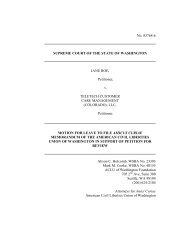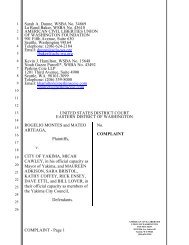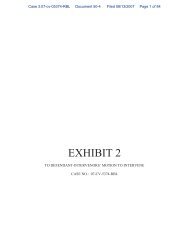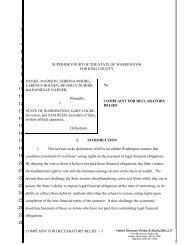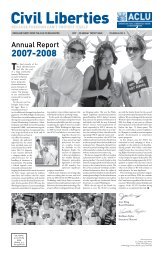BERGER v. CITY OF SEATTLE - ACLU of Washington
BERGER v. CITY OF SEATTLE - ACLU of Washington
BERGER v. CITY OF SEATTLE - ACLU of Washington
Create successful ePaper yourself
Turn your PDF publications into a flip-book with our unique Google optimized e-Paper software.
<strong>BERGER</strong> v. <strong>CITY</strong> <strong>OF</strong> <strong>SEATTLE</strong><br />
223<br />
[7] Nor does the permit requirement fail the narrow tailoring<br />
test for underinclusiveness. 20<br />
Berger argues that the rule<br />
does not match its purpose because it “targets street performers<br />
while allowing large crowds engaged in other types <strong>of</strong><br />
expression to gather without a permit.” However, narrow tailoring<br />
does not require comprehensiveness: a rule is “narrowly<br />
tailored” as long as the significant interest <strong>of</strong> the government<br />
a religious one or is a bona fide object <strong>of</strong> charity or philanthropy and conforms<br />
to reasonable standards <strong>of</strong> efficiency and integrity.” Id. at 302. The<br />
Court decided that the statute violated the free exercise clause <strong>of</strong> the First<br />
Amendment because it constituted a “censorship <strong>of</strong> religion.” Id. at 305.<br />
Likewise, in Schneider v. New Jersey, 308 U.S. 147 (1939), the Court<br />
deemed unconstitutional a content-based statute that subjected prospective<br />
speakers to “the power <strong>of</strong> a police <strong>of</strong>ficer to determine, as a censor, what<br />
literature may be distributed.” Id. at 163. And in Village <strong>of</strong> Schaumburg<br />
v. Citizens for a Better Environment, 444 U.S. 620 (1980), the Court invalidated<br />
an ordinance requiring permits for solicitation and barring any such<br />
solicitation “by charitable organizations that do not use at least 75 percent<br />
<strong>of</strong> their receipts for ‘charitable purposes.’ ” Id. at 623. The Court did not<br />
object to the provision requiring permits for organizations that passed the<br />
75-percent threshold; rather, the Court found unjustifiable the rule denying<br />
permits to organizations that did not pass such threshold. The Court did<br />
not object to the fact that a permit was required, but to the reasons for<br />
which permits could be denied. See id. at 640 (“The 75-percent requirement<br />
plainly is insufficiently related to the governmental interests asserted<br />
in its support to justify its interference with protected speech.”). Citing its<br />
prior rulings in Cantwell, Jamison v. Texas, 318 U.S. 413 (1943), and<br />
Schneider, the Court reiterated that “ ‘a state m[ay] not prevent the collection<br />
<strong>of</strong> funds for a religious purpose by unreasonably obstructing or delaying<br />
their collection.’ ” Village <strong>of</strong> Schaumburg, 444 U.S. at 631.<br />
The statutory rules rejected in Cantwell, Schneider, Jamison, and Village,<br />
can be distinguished easily from the Seattle Center’s permit requirement,<br />
which does not support such content-based censorship.<br />
20 The district court disagreed, holding the rules to be underinclusive<br />
because they did not reach activities with “a greater impact on Seattle<br />
Center patrons and tenants” and to be overbroad because they barred more<br />
expression than “they were intended to reach.” The court did not reach<br />
Berger’s final argument, that the rules foreclose all avenues <strong>of</strong> communication<br />
“because no performances are permitted anywhere at the Seattle<br />
Center without a permit.”



